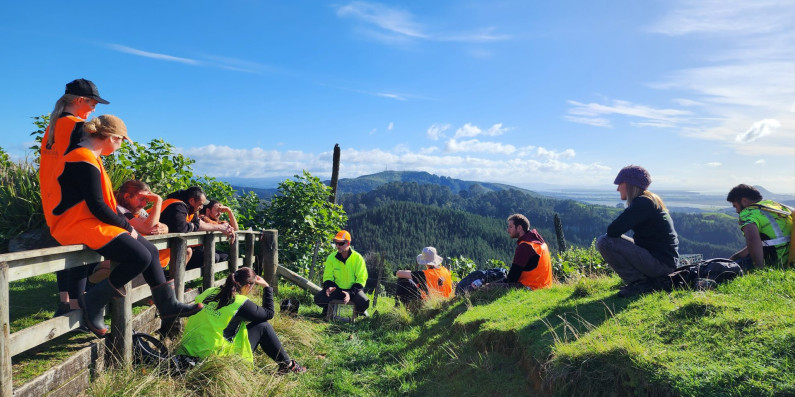
Jobs for Nature Programme provides insights for delivering environmental projects
We, at the Ministry for the Environment, wanted to know what helps projects succeed.

We, at the Ministry for the Environment, wanted to know what helps projects succeed.
To gain insights into what creates success, we held interviews earlier this year with people involved in three of the Ministry’s Jobs for Nature projects. Jobs for Nature is a Government programme which creates nature-based jobs to improve our environment. The Ministry is one of five government agencies managing the programme.
For all three projects, the following actions were contributing to successful project outcomes:
The Bay Conservation Cadets – Tauira Mahi programme is a 12-week training and employment programme for 140 cadets of all ages and backgrounds. It’s run by the Bay Conservation Alliance (BCA) in the Bay of Plenty.
They work closely with iwi, community groups and landowners to give cadets training opportunities and conservation experience. So far 60 cadets have completed the programme with 87 per cent going on to employment in conservation or other environmental areas.
The relationship between Tangata Whenua and the Tauira Mahi programme brings mutual benefits and continue to grow and lead to new opportunities.
The cadets develop good working relationships with iwi kaiako - teachers and local Māori specialists who teach them skills, knowledge and mātauranga Māori.
Many cadets continue to assist iwi with environmental and conservation work after completing the Tauira Mahi programme.
Cadets are employed by BCA for the 12-week Tauira Mahi programme.
For many of the cadets, being paid enabled them to participate and fully focus on the training without the financial pressure of making ends meet during the programme. Many cadets say that being paid was an added benefit to all the learning they were receiving.
Find out more about the Tauira Mahi [Bay Conservation NZ website]
This restoration project aims to improve the water quality of Te Hoiere Pelorus River while providing training and employment opportunities.
The river is the largest catchment draining into Marlborough Sounds and it is a significant area for Ngāti Kuia.
The local community developed and currently lead the project in collaboration with non-government organisations, and local and central government agencies.
Before funding was available, some of Te Hoiere community were concerned about the health of the catchment and the community started to come together to restore the catchment.
Funding from the Jobs for Nature Programme enabled an extensive engagement with the community to understand their aspirations for the catchment.
Now the project is underway, the project team and partners are keeping the community informed of the project’s progress through regular workshops and newsletters.
The project team has found that employing local catchment care officers and kaitiaki is helping to get the community involved in the project and learning new practical skills in conservation.
The project team and Ministry for the Environment were able to reprioritise the funding to address the damage caused by the July 2021 floods.
These floods affected the top of the South Island delaying the restoration project and caused major damage to homes, land and farms.
“We felt grateful that the funding was not as restrictive as we thought. Provided it aligned with the priorities of the project, we were able to pivot the funding [with the Ministry’s agreement] to address the damage the storms caused.”
Find out more about the project [Marlborough District Council website]
Whakaora Te Waikēkēwai is a four and a half-year project aimed at restoring te Waikēkēwai Stream in Canterbury, enhancing mahinga kai opportunities, and increasing indigenous biodiversity in the catchment.
Te Taumutu Rūnanga leads this project, and it is co-managed in partnership with Environment Canterbury Regional Council (Environment Canterbury).
This project is not only significant for what it is doing, but also for how it is doing it.
Because the project is led by Te Taumutu Rūnanga, co-managed by Te Taumutu Rūnanga with Environment Canterbury, and governed by the Te Waihora Co-Governance Group (through the Whakaora Te Waihora programme), it has been a model for Treaty partnership, with mana whenua participating and making decisions through all levels of a project – from delivery to governance.
The project team (Taumutu Rūnanga and Environment Canterbury) has also developed key relationships with community groups, for instance Ellesmere Sustainable Agriculture Inc and Pest Free Banks Peninsula. These relationships are helping connect initiatives across the catchment and create a support network.
“Work with other groups within the area […] is a real highlight. Helpful as a sounding board. Great having a network.”
Te Taumutu Rūnanga put time into recruiting the right skilled local staff for the project.
Like Te Hoiere project, the Whakaora Te Waikēkēwai project team has appointed trusted local champions, kaitiaki/rangers and catchment coordinators to work with landowners. These team members live locally and are instrumental in earning community support.
"We are proud of our appointments. We invested a lot of time and effort getting them on board.” Project team
Find out more about the Whakaora Te Waikēkēwai [Environment Canterbury Regional Council website]
Find out more about the Jobs for Nature Programme
Photo: Bay Conservation Alliance